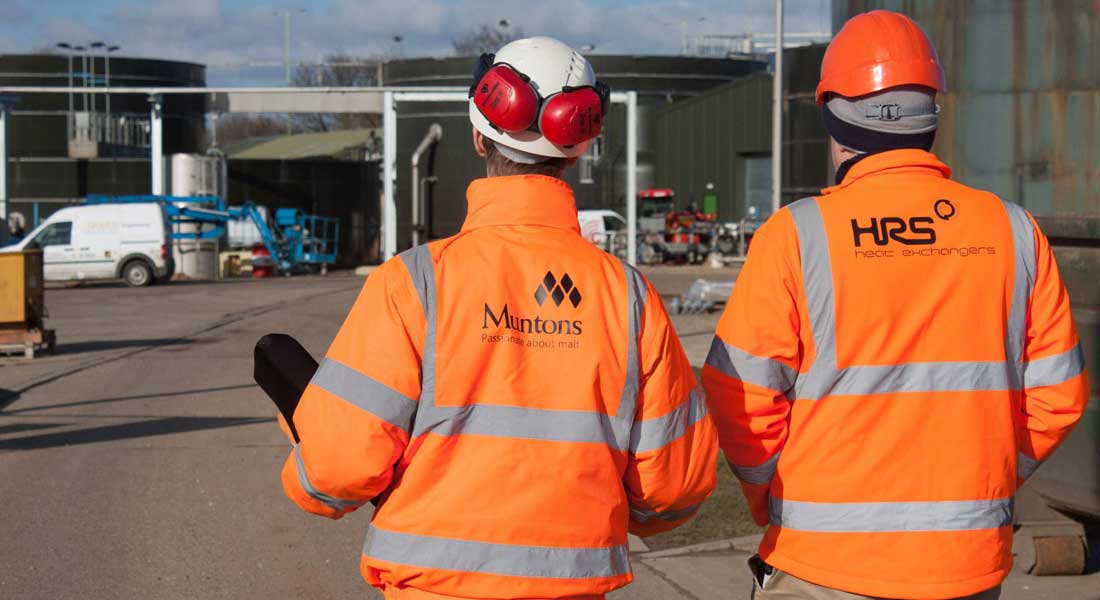HRS helps Muntons slash 1159 tonnes of CO2 per annum
Challenge
Like many companies, Muntons based in Stowmarket, Suffolk, is a company with sustainability at its core. Eager to enhance its environmental footprint and reduce energy consumption, the malted ingredient company sought a way to pasteurise the digestate from its new £5.4m on-site anaerobic digestion (AD) plant, creating a digestate that could be safely used as an organic fertiliser by farmers supplying the company with barley. Thanks to the installation of a 3-tank pasteuriser unit supplied by HRS, Muntons has helped to reduce the firm’s CO2 emissions from 27,264 to 26,605 tonnes per annum, the emission equivalent of removing 300 average family cars from the roads.

Benefits of HRS’s 3-tank design
While one tank is being filled, the second tank holds the sludge at 70°C at the same time as the third tank is being emptied (each process lasts one hour).
Waste cooling water from the CHP engine is used to heat the sludge in corrugated tube-in-tube heat exchangers, which is more efficient than heating an entire tank of digestate.
HRS also incorporated an energy recovery section: energy is transferred from the hotter (pasteurised) sludge to the colder (unpasteurised) sludge, reducing energy consumption by up to 70% compared to normal systems and uses heat that would otherwise be wasted.
Solution:
Having conducted its own analysis, Muntons discovered that 60% of the carbon footprint from its supply chain came from the artificial fertiliser used by its barley growers. Producing fertiliser with a lower energy requirement was therefore crucial to reducing its overall carbon footprint.
Integral to the success of the 499 kW facility is a 3 Tank Batch Sludge Pasteuriser System with Energy Recovery from HRS Heat Exchangers. This unit allows sufficient treatment capacity while reusing as much heat as possible to reduce overall plant energy consumption.
The AD plant was designed to:
- Replace the reliance on artificial fertiliser used by the company’s network of barley growers that produce some of the 250,000 tonnes of barley needed to make Muntons’ malt.
- Increase traceability, tracking every batch of digestate back to the feedstock from which it was produced using HRS’s monitoring feature.
- Meet the stringent PAS 110 standards – this is achieved by pasteurising the digestate to generate a high quality fertiliser that satisfies the demands of the barley growers.
- Reduce the overall volume of tanker movements by over 3,000.
- Generate 25% of the electricity used at the site by recovering the energy.
- Run at half flow rate should the volume of digestate stock reduce.
Results
- Project delivered in 16 weeks.
- Processes up to 80,000 tonnes of Muntons’ liquid malt waste annually turning into quality organic fertiliser.
- Recovers 40% of the total energy used, reducing energy consumption by up to 70%, saving the business money and further reducing CO2.
Testimonies
“The fact that the HRS system offers batch reporting was also a big draw; traceability is very important to us. Their solution enables us to make use of an abundance of waste hot water. Not only does the tube-in-tube technique deliver improved performance, they’re also more resistant to fouling, which means less downtime and maintenance. In addition, we had a short deadline – just 16 weeks – which HRS easily met.”
Lawrence Howes, Project Engineer at Muntons.
“For Muntons, this whole project has been about maximising efficiency. Although they have an abundance of heat, they still wanted to recapture what they could – our heat exchangers will provide at least 40% heat regeneration.”
Matt Hale, International Sales Manager at HRS